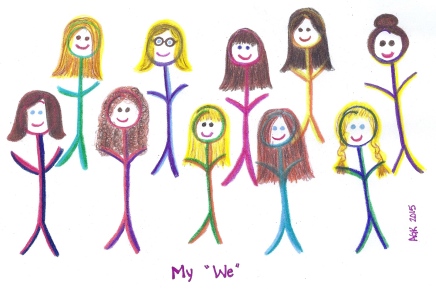 I occasionally tell my students that we all have gaps in our education, things we misunderstood or never really grasped to begin with. Sometimes, we don’t even know we have it wrong. One night in college, I was up late studying biology. I was all alone. It was quiet. Something was not quite right. No one was around to ask, so I just kept staring at the textbook, flipping pages, staring again. According to my book, atoms made up cells, but that couldn’t be right. Cells, I knew, made up material things like people and trees, whereas atoms made up chemicals like oxygen and hydrogen. Yep. That’s what I thought. Sometimes, I tell my students, we just miss obvious things.
I occasionally tell my students that we all have gaps in our education, things we misunderstood or never really grasped to begin with. Sometimes, we don’t even know we have it wrong. One night in college, I was up late studying biology. I was all alone. It was quiet. Something was not quite right. No one was around to ask, so I just kept staring at the textbook, flipping pages, staring again. According to my book, atoms made up cells, but that couldn’t be right. Cells, I knew, made up material things like people and trees, whereas atoms made up chemicals like oxygen and hydrogen. Yep. That’s what I thought. Sometimes, I tell my students, we just miss obvious things.
Last weekend, I went to my annual women’s retreat. It’s one of my very favorite weekends of the entire year. As usual, I heard many insights into recovery that resonated with me. One, though, (maybe because I fear everyone but me already knows it) has been keeping me up at night.
I have always thought I understood the necessity of the “we” portion of the program. When I was drinking, I felt isolated and alone. Towards the end, I didn’t speak to anyone that was not absolutely necessary: my boss, maybe the check-out person at the liquor store. I know I didn’t have any “real” conversations. The fact that I was chronically and fatally depressed or that my life was a shambles, was never openly admitted, not that I even had someone to tell had I wanted to. When I finally found recovery, I clung to the group, hanging on for dear life. I stuck to the middle of the herd, found a home group, got a sponsor I could be accountable and honest with, performed service work, went on twelve step calls. I did all that things one does when they are trying not to spin off the side of the record.
Last weekend, though, a friend altered my perception of the “we” part of the program. She said something in just the way to tweak it in my mind and bring about a new realization. My friend was re-working her steps. She had done her fourth step inventory, but had yet to meet up with her sponsor. But she had years of sobriety. She had some independence in the issue, so she went ahead and filled out the fourth column. She knew her part and could see the pattern of behaviors. And yet, she had no relief. The thoughts and emotions were still with her, rummaging around in her mind.
My friend realized that relief does not come from the act of writing the fourth step, but of speaking the fifth step. As she put it, until the words were actually spoken, the thoughts still took home in her mind.
Only after she spoke did I realize that my intellectual mind had always supposed something happened with the admission of resentments and faults to ourselves. One would think that simply the admission of transgressions to ourselves would give us something, some kind of relief. But it doesn’t. Half measures avail us nothing. It seems so obvious. I’ve heard it a million times. We admitted we were powerless…We came to believe… our wills and our lives… etc.
The “we” part is not a piece of the program, a part of it that encompasses the social or service portion of the steps. Over here are the meetings and service, and over there are the steps. They do not exist simultaneously but separate. No, the “we” makes up all the other stuff. The “we” is the atom and the steps are the cells. It is the core, the essential, the thing from which all the other stuff is made.
I think missing the group is why people who separate from the program, who think the lessons that they have learned in AA can carry back into the real world without the support of their fellows, never seem to hang on. It seems as if they should. I believe them when they say they have every intention of hanging on. But without the sponsor, without the group, without the speaking of the words aloud to another person, there is no connection and no relief, and therefore, no recovery.

Duh I think that’s where we loose a lot of people they can’t handle the we.
LikeLike
I want to reply that maybe they just couldn’t handle you, but i am afraid people wouldn’t know you were one of my very favorite we, that i am just teasing.
LikeLike
My home group is an early morning meeting. 7:30 AM. I like the feeling of crawling out of bed in the morning, coming “downstairs” (we meet in a church basement), and pouring myself a cup of coffee. It’s like sitting down at the kitchen table with family. There is no better way to begin the day.
LikeLike
I was recommended a booked titled (I think), “What’s so Amazing about Grace.” Supposedly, it speaks to the the people under the stairs or maybe the people down the stairs, meaning the AA people. Have you heard of it?
LikeLike